News >> World
Bloodiest day in Egypt
Govt says 525 killed, Brotherhood claims over 2000 deaths
 16 Aug, 2013
16 Aug, 2013
Cairo is reported quiet but tense after a crackdown on Islamists which left hundreds dead and drew international condemnation.
The government says 525 died nationwide on Wednesday, but the final toll is likely to be significantly higher.
Scores of bodies have not been registered, because the official count only includes bodies which have passed through hospitals.
The BBC's Khaled Ezzelarab has reported seeing at least 140 bodies wrapped in shrouds at the Eman mosque, close to the main protest camp at Rabaa al-Adawiya Square. These will not have been counted in the official toll.
The Muslim Brotherhood insists that more than 2,000 people died. It says 300 bodies were taken to the Eman mosque, and other bodies were taken to sports halls. Reports speak of disputes between bereaved relatives and officials entrustedwith documenting the causes of death.
A state of emergency was declared after the bloodiest day in Egypt since the pro-democracy uprising two years ago.
US Secretary of State John Kerry said the events were "deplorable".
They were "a real blow to reconciliation efforts" he added, while EU foreign policy chief Catherine Ashton and UN Secretary-General Ban Ki-moon also criticised the use of force.
Egyptians awoke to a frightening and uncertain future, the BBC's Bethany Bell reports from Cairo.
Hundreds of people gathered at the mosque this morning, mostly relatives of those killed. There are dozens of bodies wrapped in white shrouds inside the mosque. I counted 70 bodies and then I stopped when I realised this was less than half.
Relatives' nerves are frayed as they try to figure out how they can bury their loved ones while ensuring they get proper documentation. Families tell me that hospitals refused to provide documents about the real cause of death.
There is an upside-down burnt-out car outside the mosque. People here say it belonged to a policeman who passed by and tried to shoot. He was taken away.
While we were here, we heard gunshots as a military vehicle sped by, apparently shooting in the air to clear the street. Some people are now setting up barricades to the block the roads around the mosque.
Even after the state of emergency curfew on Thursday morning, there was very little traffic on the central streets and the bridges across the Nile, she says.
'Serious blow'
The BBC's Khaled Ezzelarab reported seeing at least 140 bodies wrapped in shrouds at Eman mosque close to the main protest camp at Rabaa al-Adawiya Square.
Refuse collectors could be seen clearing the remains of the camp, while soldiers dismantled scaffolding. Charred posters of Mursi lay in heaps of debris.
The demonstrators had been demanding the reinstatement of Mursi, who was removed by the military on 3 July.
The Muslim Brotherhood, which backed the sit-ins near the mosque and in Nahda Square, says the true number of people killed on Wednesday is more than 2,000.
Giving an update on the death toll, the military-backed interim government said 137 people had died near the mosque, 57 in Nahda Square and 29 in Helwan, in the south of the city. The other 198 deaths occurred in the provinces.
At least 43 police officers are reportedly among the dead. A further 3,572 people were injured.
The Muslim Brotherhood is likely to continue with its protests, says BBC Middle East editor Jeremy Bowen.
They waited 80 years to take power in Egypt and they feel that power was taken away from them unjustly, he adds.
Kerry said Egypt's political reconciliation efforts had suffered a "serious blow".
"This is a pivotal moment for all Egyptians," he said. "The path toward violence leads only to greater instability, economic disaster and suffering."
The office of UN chief Ban Ki-moon said he regretted that the Egyptian authorities had chosen to use force while "the vast majority of the Egyptian people want their country to go forward peacefully in an Egyptian-led process towards prosperity and democracy".
"Strongly" condemning the violence, Mrs Ashton said that "only a concerted effort by all Egyptians and the international community might lead the country back on a path to inclusive democracy".
Aerial footage showed multiple fires on Cairo's streets on Wednesday
In a televised address, Egyptian Interim Prime Minister Hazem Beblawi defended the operation, saying the authorities had to restore security.
Expressing regret for the loss of life, he said the state of national emergency would be lifted as soon as possible.
The measure imposes a curfew in Cairo and several other provinces between 19:00 local time (17:00 GMT) and 06:00.
Interior Minister Mohammed Ibrahim said the police had "dealt professionally" with the protesters, and accused the pro-Mursi protesters of firing birdshot at police.
Following the violence, Vice-President Mohammed ElBaradei announced his resignation from the interim government, saying he could not "shoulder the responsibility for a single drop of blood".
Source: new nation

